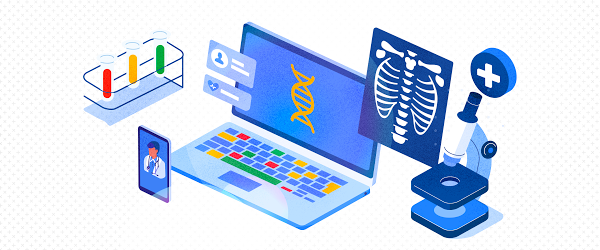Great technology gives us new ways of seeing and working with the world. The microscope enabled new scientific understanding. Trains and telegraphs, in different ways, changed the way we think about distance. Today, cloud computing is changing how we can assist in improving human health.
When you think of the healthcare system, it historically includes a visit to the doctor, sometimes coupled with a hospital stay. These are deeply important events, where tests are done, information on the patient is gathered, and a consultation is set up. But as you think about this structure, there are also limits. Multiple visits are inconvenient and potentially distressing for patients, expensive for the healthcare system and, at best, provide a view of patient health at a specific point in time.
But what if that snapshot of health could be supplemented with a stream of patient information that the doctor could observe and use to help predict and prevent diseases? By harnessing advancements in wearables—devices that sense temperature, heart rate, and oxygen levels—combined with the power of cloud and artificial intelligence (AI) technologies, it is possible to develop a more accurate understanding of patient health.
This broader perspective is the goal of a collaboration between cardiologists at The Hague’s Haga Teaching Hospital, Fitbit—one of the world’s leading wearables that tracks activity, sleep, stress, heart rate, and more—and Google Cloud.
Initially focusing on 100 individuals who have been identified as at-risk of developing heart disease, during a pilot study (ME-TIME), cardiologists at the hospital will give patients a Fitbit Charge 5—Fitbit’s latest activity and health tracker with ECG monitoring1—to wear at home after an initial consultation.
With user consent, the devices will send information about certain patient behavioural metrics to the hospital via the cloud, in an encrypted state.
This data is only accessed by (Haga Teaching Hospital approved) physicians and data scientists at the hospital and is not used by Haga for any other purposes than medical research during the study.2 With user consent, the data, which includes the amount of physical activity a patient is undertaking, will be monitored by Haga ’s physicians against other clinical information already gathered about the individual by the hospital during prior consultations.
With user consent, Haga Teaching Hospital will also compare the data against its other relevant pseudonymized experience data, so the hospital can learn more about potential patterns and abnormalities associated with certain heart conditions. This is made possible by Google Cloud’s infrastructure, which will be used to store the encrypted data at scale, while artificial intelligence (AI) and data analytics tools will power near real-time analysis. For example, predictive analytics on this data could help identify early signs of a life-threatening disease such as a heart attack or stroke, so doctors can investigate further and provide preventative treatment—even before symptoms arise.
Haga is using Device Connect for Fitbit, a new solution from Google Cloud, as part of the trial. Now available for healthcare and life sciences enterprises, the solution empowers business leaders and clinicians with accelerated analytics and insights from consenting users’ Fitbit data, powered by Google Cloud.3
The project is in collaboration with partner Omnigen who has supported Haga with deployment, in addition to processing and analysis of data.
Other hospitals in the Netherlands are already expressing interest in participating in similar projects. Longer term, we see applications to help with deeper understanding of overall population health for healthcare professionals, reducing unnecessary visits to the hospital – and better operation of the wider healthcare system. Preliminary results of the project may be available as early as the end of this year.
“Health is a precious commodity. You realise that all the more if you are struck down by an illness. If you can prevent it or catch it in time so that it can be treated, you have gained a great deal,” said cardiologist, Dr. Ivo van der Bilt of Haga Teaching Hospital, who has been leading on this collaboration. “Digital tools and technologies like those provided by Google Cloud and Fitbit open up a world of possibilities for healthcare and a new era of even more accessible medicine is possible.”
“This collaboration shows how Fitbit can help support innovation in population health, helping healthcare systems & care programmes create more efficient and effective care pathways that aren’t always tied to primary or secondary care settings. Plus it provides patients with tools to help them with their health and wellbeing each day, with metrics which can be overseen by clinical care teams.” said Nicola Maxwell, Head of Fitbit Health Solutions Europe, Middle East & Africa.
This collaboration is an important step towards a goal of creating a more dynamic, rich, and holistic understanding of human health for hospitals, carried out with a strong emphasis on transparency. We are proud to be part of a project that we expect can help patients and healthcare workers alike. We believe this is only the start of what’s possible in healthcare with digital tools like Fitbit and cloud computing.
1. The Fitbit ECG app is only available in select countries. Not intended for use by people under 22 years old. See fitbit.com/ecg for additional details.
2. Haga Teaching Hospital is responsible for any consents, notices or other specific conditions as may be required to permit any accessing, storing, and other processing of this data. Google Cloud does not have control over the data used in this study, which belongs to Haga Teaching Hospital. More generally, Google’s interactions with Fitbit are subject to strict legal requirements, including with respect to how Google accesses and handles relevant Fitbit health and wellness data. Details on these obligations can be found here.
3. This is the same data as that made available through the Fitbit Web API, which the Device Connect integration is built on.
Cloud BlogRead More


